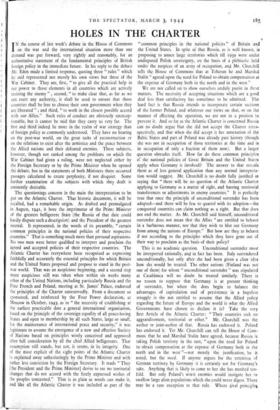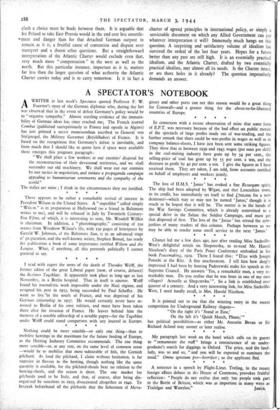HOLES IN THE CHARTER
IN the course of last week's debate in the House of Commons on the war and the international situation more than one demand was put forward, very rightly and reasonably, for an authoritative statement of the fundamental principles of British foreign policy in the immediate future. In his reply to the debate Mr. Eden made a limited response, quoting three " rules " which he said represented not merely his own views but those of the War Cabinet. They are, first, " to give all the practical help in our power to those elements in all countries which are actively resisting the enemy " ; second, " to make clear that, as far as we can exert any authority, it shall be used to ensure that 'those countries shall be free to choose their own government when they are liberated " ; and third, " to work in the closest possible accord with our Allies." Such rules of conduct are obviously unexcep- tionable, but it cannot be said that they carry us very far. The first and third indeed lie more in the realm of war strategy than of foreign policy as commonly understood. They have no bearing on the post-war world, on the great tasks of reconstruction er on the relations to exist after the armistice and the peace between the Allied nations and their defeated enemies. These subjects, however, though not ranked among the problems on which the War Cabinet had given a ruling, were not neglected either by the Foreign Secretary or by the Prime Minister when he opened the debate, but in the statements of both Ministers there occurred passages calculated to create perplexity, if not disquiet. Some further examination of the subjects with which they dealt is eminently desirable.
The questionings concern in the main the interpretation to be put on the Atlantic Charter. That historic document, it will be recalled, had a remarkable origin. As drafted and promulgated in August, 1941, it bore the imprimatur of the Prime Minister of the greatest belligerent State (the Russia of that date could hardly dispute such a description) and the President of the greatest neutral. It represented, in the words of its preamble, " certain common principles in the national policies of their respective countries." That is something much more than personal aspirations. No two men were better qualified to interpret and proclaim the agreed and accepted policies of their respective countries. The Atlantic Charter has everywhere been recognised as expressing faithfully and accurately the essential principles for which Britain and the United States proposed and propose to stand in the post- war world. That was an auspicious beginning, and a second step more auspicious still was taken when within six weeks many other of the United Nations, including particularly Russia and the Free French and Poland, meeting at St. James' Palace, endorsed the principles of the Charter unreservedly. From a document so sponsored, and reinforced by the Four Power declaration, at Moscow in October, 1943, as to " the necessity of establishing at the earliest practicable date a general international organisation, based on the principle of the sovereign equality of all peace-loving States and open to membership by all such States, large or small, for the maintenance of international peace and security," it was legitimate to assume the emergence of a new and effective Society of Nations based on principles wisely conceived and approved after full consideration by all the chief Allied belligerents. That assumption still stands, but not, it seems, in its integrity. One of the most explicit of the eight points of the Atlantic Charter is explained away unhesitatingly by the Prime Minister and with rather less conviction by the Foreign Secretary. It reads " They [the President and the Prime Minister] desire to see no territorial changes that do not accord with the freely expressed wishes of the peoples toncerned." That is as plain as words can make it, and like all the Atlantic Charter it was included as part of the " common principles in the national policies" of Britain and the United States. In spite of that Russia, as is well known, is proposing to annex large territories which till 1939 were under undisputed Polish sovereignty, cm the basis of a plebiscite held under the auspices of an army of occupation, and Mr. Churchill tells the House of Commons that at Teheran he and Marshal Stalin " agreed upon the need for Poland to obtain compensation at the expense of Germany both in the north and in the west."
We are not called on to show ourselves unduly purist in these matters. The necessity of accepting situations which are a good deal less than satisfactory has sometimes to be admitted. The hard fact is that Russia intends to incorporate certain sections of the former Poland, and whatever our views on that, or on the manner of effecting the operation, we are not in a position to prevent it. And so fal. as the Atlantic Charter is concerned Russia can no doubt argue that she did not accept the Charter retro- spectively, and that when she did accept it her annexation of the Baltic States and part of Poland was already past history (though she was not in occupation of those territories at the time and is in occupation of only a fraction of them now). But a larger question obtrudes itself. How far do these common principles of the national policies of Great Britain and the United States apply when Germany is involved? The answer to that reveals them as of less general application than any normal interpreta- tion would suggest. Mr. Churchill is no doubt fully justified in saying that " there will be no question of the Atlantic Charter applying to Germany as a matter of right, and barring territorial transferences or adjustments in enemy countries." It is perfectly true that once the principle of unconditional surrender has been adopted—and there will be few to quarrel with its adoption—the conquered countries can claim nothing as a right. But that does not end the matter. As Mr. Churchill said himself, unconditional surrender does 'not mean that the Allies " are entitled to behave in a barbarous manner, nor that they wish to blot out Germany from among the nations of Europe." But how are they to behave if not according to the principles which they have gone out of their way to proclaim as the basis of -their policy?
This is no academic question. Unconditional surrender must be interpreted rationally, and in fact has been. Italy surrendered unconditionally, but only after she had been given a clear idea how she would be treated. The other nations (Finland was not one of them) for whom " unconditional surrender " was stipulated at Casablanca will no doubt be treated similarly. There is no reason to suppose that Germany is at present thinking of surrender, but when she does begin to balance the advantages of capitulation and of persistence in a hopeless struggle is she not entitled to assume that the Allied policy regarding the future of Europe and the world is what the Allied Governments have chosen to declare it is? Take the very first Article of the Atlantic Charter: " Their countries seek no aggrandisement, territorial or other." Mr. Churchill was the author or joint-author of that. Russia has endorsed it. Poland has endorsed it. Yet Mr. Churchill can tell the House of Com- mons that he and Marshal Stalin have agreed, because Russia is taking Polish territory in the east, " upon the need for Poland to obtain compensation at the expense of Germany both in the north and in the west "—not merely the justification, be it noted, but the need. If anyone argues for the retention of German territory by Germany it is certainly not for Germany's sake. Anything that is likely to come to her she has merited ten- fold. But only Poland's worst enemies would instigate her, to swallow large alien populations which she could never digest. There may be a rare exception to that rule. Where rival principle; clash a choice must be blade between them. It is arguable that for Poland to take East Prussia would in the end cost less unsettle- ment and danger than for that detached German outpost to remain as it is, a fruitful cause of contention and dispute over transport and a dozen other questions. But a straightforward interpretation of the Atlantic Charter would exclude even that, very much more " compensation " in the west as well as the north. But this particular instance, important as it is, matters far less than the larger question of what authority the Atlantic Charter carries today and is to carry tomorrow. Is it in fact a charter of agreed principles in international policy, or simply a serviceable document on which any Allied Government can put whatever interpretation it will? Immensely much hangs on this question. A surprising and satisfactory volume of idealism has survived the ordeal of the last four years. Hopes for a future better than any past are still high. It is an essentially practical idealism, and the Atlantic Charter, drafted by two essentially practical idealists, met almost all its needs. Is the Charter intact, or are there holes in it already? The question imperatively demands an answer.



























 Previous page
Previous page